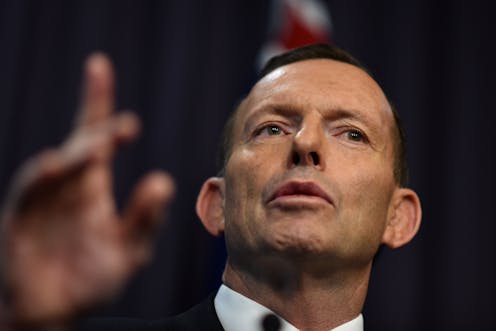Research suggests Tony Abbott's climate views are welcome in the Hunter Valley
- Written by Vanessa Bowden, Associate Lecture in Social Enquiry, University of Newcastle

Former Prime Minister Tony Abbott this week drew renewed attention to himself with a speech to the Global Warming Policy Foundation, a London-based climate sceptic group, in which he voiced a range of doubts about climate science and policy, and claimed that climate change is “probably doing good”.
The comments might come as no surprise to those familiar with his views. But what’s arguably more surprising is the prevalence of similar opinions among some Australian business leaders.
My research, published this week in the journal Environmental Sociology, features interviews with business leaders in the Hunter Valley of New South Wales – a major coal-producing hub.
It reveals that Abbott’s doubts about the veracity of climate science and its forecast impacts, and his scathing dismissal of those concerned about climate change, have a long history of support among the Hunter Valley’s business leaders.
Read more: A brief history of fossil-fuelled climate denial
Carried out in the lead-up to the implementation of the Gillard Labor government’s price on carbon in 2011, my research sought to understand business leaders’ attitudes to government policies and to climate change more broadly.
I approached 50 chief executives of organisations operating in the Hunter Region, of whom 31 agreed to participate (or had a senior staff member take up the opportunity).
They were asked questions about their views on climate change, how and whether their organisation was responding to the issue, and what they thought about the various political parties’ policies in response to it.
Perhaps not surprisingly, participants’ overwhelming concern was that the economy might decline as a result of climate policies such as pricing carbon.
While some were concerned about climate change, there was almost unanimous opposition to carbon pricing. Given the politics of the time, this too is unremarkable, particularly in light of the success Abbott enjoyed at the 2013 election after pledging to scrap the policy.
What was surprising, however, was the pervasive scepticism among participants about the science of climate change. This is especially the case given that many people now view the debate over whether climate change is happening – and whether it is caused by human activity – as being over.
Moreover, many participants believed that climate scientists were motivated by financial rewards in arguing that climate change is a serious concern.
These beliefs were voiced not only by those in industries like coal, aluminium, and shipping - but echoed by participants from other industries, revealing a deep scepticism of both the discipline and the science of climate change itself.
It is noteworthy that the research was focused on the Hunter Valley and Newcastle, home to the world’s biggest coal port.
Participants also held intensely antagonistic views in relation to the environment movement and the Australian Greens, believing their views were quasi-religious and that they too were self-interested and unrealistic in wanting to tackle climate change.
In some ways the extremity of these comments was striking. Although prominent in writings by conservative columnists at the time, the broader debate was much more focused on jobs and the economy.
A small minority of participants did support some type of mechanism to limit greenhouse emissions, and were concerned about the environment.
But more broadly, my research showed that the Hunter Region’s business leaders – whether or not they were directly involved in coal – had taken on board many of the arguments promulgated by the industry in its ultimately successful campaign against carbon pricing in Australia.
Read more: Hashtags v bashtags: a brief history of mining advertisements and their backlashes
These dynamics may have changed a little in recent times, with companies such as AGL and BHP shifting away from coal.
The overall dynamics of the climate politics, however – as revealed in the current stalemate over responding to the Finkel Review – remains out of step with what the climate science is telling us. As, of course, do Abbott’s comments.
Abbott’s London speech was interpreted as incendiary, and earned him a sharp rebuke from government colleagues. But when we look at the places where his message might be received more favourably, it becomes apparent there are still pockets of the country where he might expect to find a plentiful and powerful audience.
Authors: Vanessa Bowden, Associate Lecture in Social Enquiry, University of Newcastle





